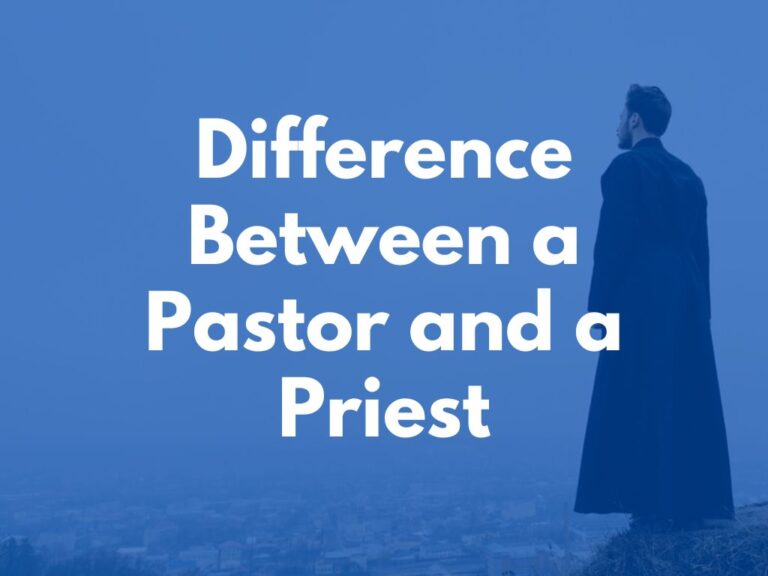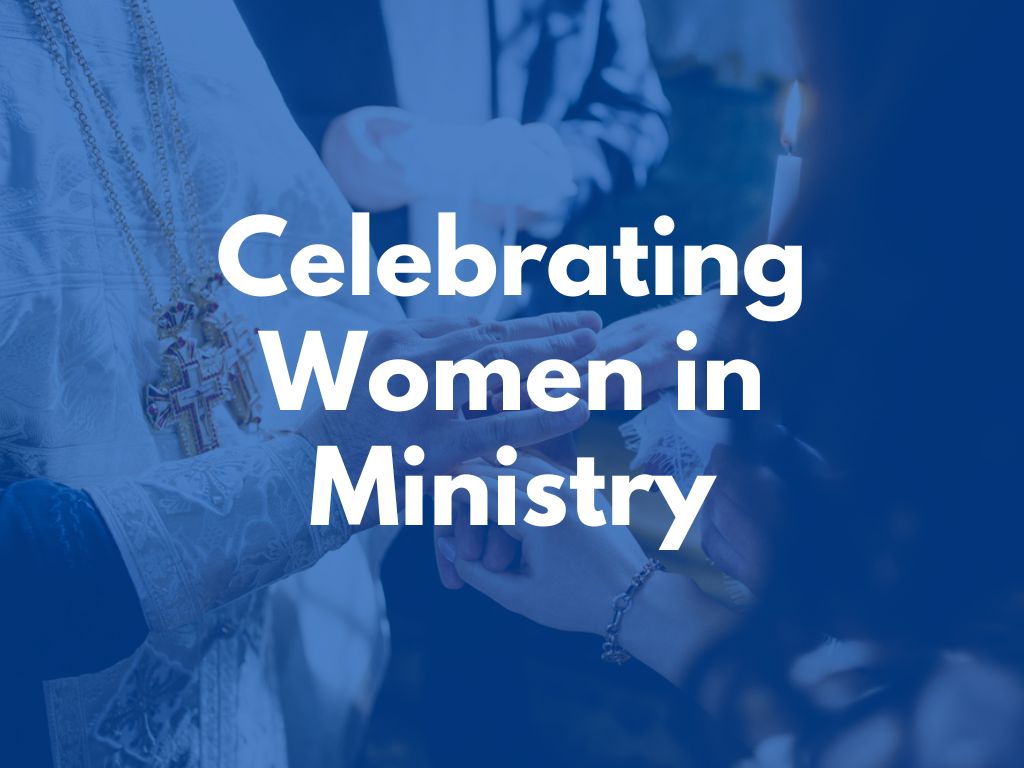What is the Difference Between a Pastor and a Priest?
Most Christian congregations have, at their heart, either a pastor or priest. They provide spiritual leadership, teaching, and care to their congregation. While clergy in both roles are shepherds of their flocks, there often is little understanding of the differences between them—how they are assigned to their work, their responsibilities, and what they do as part of their theological practices. Examining these differences can enhance our respect for clergy and help us better understand the unique ways in which they serve their communities of faith.
If you are looking for clarity about the nature of a vocation to understand the gifts that Christian leaders can make to church and society, this comparison of pastor and priest can be helpful. It can assist those who are discerning a call, as well as those who seek a deeper appreciation of the variety of ways that Christians serve God and each other.
At United Theological Seminary, we celebrate this diversity by offering an inclusive and welcoming environment for students from a wide variety of Christian traditions. Whether you’re drawn to the role of a pastor, priest, or another form of ministry, United provides the education, spiritual formation, and community support to help you pursue your calling with confidence and purpose.
Definition of a Pastor
The Role of a Pastor in Christian Communities
The first point to note is that a pastor is the spiritual leader and shepherd of a Christian community (or congregation), particularly in Protestant communities. The term is derived from the Latin noun pastor, which literally means “shepherd.” And it is this role—as a spiritual shepherd for a community of followers of Christ—that lies at the heart of the pastor’s work: to care for God’s people and help them grow in their faith and life. Pastors are called to care for their spiritual flock, to teach and counsel, and to lead their congregations to Christ.
Duties and Responsibilities
The role of a pastor includes many facets, which can involve ministering to the needs of the congregation, including:
- Proclaiming and Pastoring: Preaching and teaching the Christian faith, including biblical exposition, devotional formation, and theological instruction.
- Counseling: Providing guidance to individuals and their families, visiting the sick and dying, and offering support or comfort to those in crisis or grieving.
- Organizing Worship: Planning and leading worship services, including ordinances such as baptism and communion.
- Service: Providing leadership in community outreach efforts with the surrounding community through service projects and evangelism; leading social justice efforts.
- Administrative Leadership: Overseeing church operations, mentoring staff, and managing church programs and resources.
In general, the work of a pastor is not just confined to the church, it extends to the whole community, serving as the representative of the Christian faith.
Denominations Using the Title “Pastor”
The title “pastor” is most commonly used in Protestant denominations, including:
- Baptist
- Methodist
- Lutheran
- Presbyterian
- Pentecostal
- Non-denominational Christian Churches
Although the exact duties of a pastor can depend on their denomination, the common goal is to shepherd the congregation in their walk with Christ.
Definition of a Priest
The Role of a Priest in Christian Traditions
A priest is a holy person and a religious minister who intercedes between God and humankind, particularly in liturgical and sacramental traditions. The word priest derives from the Greek presbyteros, meaning “elder.” Priests are entrusted with the duty of ministering the sacraments, conducting worship, and leading their communities in their faith and discipleship.
Unlike pastors, priests often function as delegates of their church’s hierarchy, emphasizing their status within structured and sacramental traditions. Their work entails the sacramental life of the community and fostering spiritual growth within the context of the theological and liturgical traditions of their denomination.
Duties and Responsibilities
The priest’s role centers on sacramental ministry and spiritual leadership. Key responsibilities include:
- Celebrating the Sacraments: Presiding at the Mass (the Eucharist), baptism, confirmation, matrimony, anointing of the sick, and other rites of the Church.
- Hearing Confession: Offering reconciliation and absolution to parishioners seeking forgiveness and spiritual renewal.
- Leading Worship: Conducting liturgical services, including daily prayers, Holy Communion, and feast day celebrations.
- Spiritual Support: Caring for individuals and families, counseling parishioners, and advising on matters of faith and morals.
- Performing Rites of Passage: Officiating weddings, funerals, and other significant life events within the church community.
A priest is usually highly respected within their church because they represent the church and serve as a spiritual leader for their congregation.
Denominations Using the Title “Priest”
The title “priest” is most strongly associated with Christian traditions that emphasize liturgical worship and sacramental theology, namely:
- Roman Catholic Church
- Eastern Orthodox Church
- Anglican/Episcopal Church
- Oriental Orthodox Churches
Priests are central in such traditions, bound up with the sacramentality of the community, which sees ritual as especially connected with divine grace.
Educational Pathways and Training
Educational Requirements for Pastors
Many pastors go on to study for a master’s degree or doctorate in theology, divinity, or ministry. These degrees balance academic training in biblical studies, church history, and practical ministry skills. Some examples of degrees that provide training for pastors are:
- Bachelor’s Degree: Most pastors undergo a bachelor’s degree in some kind of biblical or religious studies program, but this is not always necessary.
- Master of Divinity (MDiv): The “divinity” track is the standard degree for pastoral ministry, covering preaching, counseling, leadership, and theology.
- Master of Arts in Christian Ministries (MACM): An adaptable degree that prepares students for hands-on ministry leadership in the church, often lasting less time than the MDiv.
Alongside coursework, pastoral training typically involves internships or supervised fieldwork in which students gain direct ministry experience. This is the stage in which, for instance, students develop appropriate skills for preaching, pastoral care, and community engagement.
Educational Requirements for Priests
The process of becoming a priest is more formal and lengthy and generally takes place in a seminary. The educational steps that lead to being a priest typically include:
- Undergraduate Studies: It’s common for people who want to be priests to get a bachelor’s degree (either before or after they’ve decided to become priests); often they will take philosophy or religious studies courses as part of their preparation for studying theology.
- Graduate Studies in Theology: To advance their knowledge of theology, canon law, and liturgy, priests may pursue master’s degrees, such as the Master of Theology (ThM) or its equivalent.
- Seminary Formation: Priests are formed over a number of years in seminary, which combines academic study, spiritual formation, pastoral training, and retreats.
Priestly formation is focused on the theological and sacramental traditions of the church, preparing candidates for their ministry as mediators of the grace of God in the sacraments. Formation programs typically involve pastoral internships and intensive preparation for ordination.
How United Theological Seminary Prepares Students
Students from different traditions and denominations come to United Theological Seminary to learn theological disciplines and much more: spiritual formation and practical pastoral skills. United’s degree programs include:
- Broad-Based Degree Programs: The MDiv and the MACM provide a robust preparation for pastoral ministry.
- Advanced Degrees: Advanced degrees prepare students for scholarly endeavors or niche forms of ministry.
- Practical Training: These students are given practical tools that guide them to the ministry God has called them to do. United offers internships, fieldwork, and mentorship so that students get real-world experience to use as they serve their churches.
By crafting a curriculum that focuses on the whole person, United equips its students not only with the academic tools they need but also with the spiritual and practical tools that make their service meaningful.
Differences in Ordination and Clerical Life
Ordination Processes
The process to become a pastor or priest also differs from denomination to denomination, depending on how each group of Christians relates to God, each other, and the world around them.
- Pastors:
- In most Protestant traditions, the pastor is ordained by the affirmation of the local church or denominational body.
- There’s often an educational component (such as an MDiv), a candidacy period, and an examination on theological knowledge and pastoral readiness.
- Ordination ceremonies typically involve laying on of hands, prayer, and commissioning by church leaders.
- Priests:
- The ordination of priests is a very structured process by a bishop or other ecclesiastical authority.
- Candidates have to undergo years of seminary training and, in many cases—such as with the Roman Catholic tradition—they must make lifelong vows, such as obedience to their bishop and celibacy.
- This rite of ordination involves the laying on of hands—a sacrament that the bishop administers and confers on the priest, giving them the power to perform sacraments, such as the Eucharist.
Lifestyle Differences
The life of a pastor and that of a priest are defined by the norms and forms of their particular traditions:
- Pastors:
- In most Protestant denominations, pastors can marry, raise families, and lead broadly similar lives to their parishioners.
- Their lifestyle reflects relational ministry, community-based accessibility, and a strong emphasis on connecting with others.
- Priests:
- In the Roman Catholic and Eastern Orthodox traditions, priests often take vows of celibacy and devote their entire lives to serving God and the church. Exceptions include married priests in some Eastern Catholic rites or Anglican priests who convert to Catholicism.
- Priests live within the community of the church, with their work and lives oriented toward the spiritual and sacramental.
Differences in Sacramental Practices
Liturgical Roles
One of the most significant differences between pastors and priests is their role in the liturgy, in their worship leading, and the sacramental administration:
- Pastors:
- Protestant denominations have pastors who preside over worship services that emphasize preaching, teaching, and congregational practice.
- They preside over ordinances (as opposed to sacraments) such as baptism and communion, both of which are often considered to be primarily symbolic rather than vehicles of divine grace.
- The pastor’s function in worship emphasizes accessibility and fosters a sense of community as a shared experience of faith.
- Priests:
- In Catholic, Orthodox, and some Anglican traditions, priests lead liturgical worship in a highly structured liturgical service (such as the Mass or Divine Liturgy).
- They exist to administer the sacraments, above all the Eucharist, understood to be the true body and blood of Christ, either by transubstantiation or some kindred doctrine.
- Priests also preside over the daily liturgy, the feast day liturgy, and any other liturgies performed by the Church.
Sacraments or Ceremonies Unique to Each Role
- Pastors:
- For Protestants, the two ordinances that are most often highlighted are baptism and the Lord’s Supper, or communion. These are important parts of how Protestants worship, but they are not viewed as sacraments in the same sense as in Catholic or Orthodox Christianity.
- They serve as the spiritual leaders of parishes, celebrating weddings, funerals, and dedications to welcome newborns.
- Priests:
- Priests administer the seven sacraments, which include:
- Baptism
- Eucharist (Holy Communion)
- Confirmation
- Reconciliation (Confession)
- Anointing of the Sick
- Holy Matrimony
- Holy Orders (reserved for ordination).
- Their role as conduits of divine grace is thereby paramount, notably in those sacraments in which the priest offers absolution (in confession) or consecrates the elements (in the Eucharist).
- Priests administer the seven sacraments, which include:
Key Distinctions
Although pastors and priests alike lead their parishioners in worship and sacred celebrations, their respective theological orientations to, and boundaries of, sacramental practices could not be more different.
- Pastors: Reflecting Protestant traditions that emphasize personal faith and the supreme authority of scripture, pastors tend to highlight preaching and symbolic ordinances.
- Priests: Perform sacraments as vehicles of divine grace in accordance with the sacramental theology that permeates Catholic, Orthodox, and Anglican liturgical practices.
In this way, these differences indicate how pastors and priests work within their communities in complementary but different ways to contribute to the wider Christian tradition.
United Theological Seminary’s Approach
United respects the diversity and fruitfulness of Christian traditions and offers programs for students preparing for diverse roles in ministry, including pastoral ministry in a Protestant context, as well as lay and ordained vocations in more liturgical traditions.
- Pastoral Preparation: United’s programs—MDiv or Master of Arts in Christian Ministries (MACM)—provide a full load of coursework in preaching, leadership, and pastoral care so that students can serve congregations with confidence.
- Core Theological Education: Courses in theology, ethics, and church history help students learn their faith and are required for positions in both the Protestant and liturgical traditions.
- Real-World Experience: Students at United have opportunities for internships, fieldwork, and ministry involvement to gain real-world experience as they prepare for their roles.
Fostering an Inclusive Community
United Theological Seminary has a policy of open-mindedness in the face of diversity: We welcome all students to the Seminary. The Seminary benefits from a student body that includes persons called to ministry in a variety of ways and from diverse cultures and communities of faith. The variety of cultures and backgrounds represented at United both enrich and challenge students to learn to live in a respectful community.
- Spiritual Formation: United supports faith development and spiritual discipline, nurturing each individual’s relationship with God while helping them discern their unique vocation.
- Interdenominational Dialogue: Students interact with peers from other Christian traditions to learn how pastors, priests, or other faith leaders are perceived and participate in their respective communities. This dialogue prepares students to serve in diverse settings.
Preparing for the Future
At United Theological Seminary, students are prepared not merely for ministry in their first congregation but for a lifetime of ministry and leadership.
United’s combination of academic excellence, spiritual formation, and practical training provides graduates with the tools necessary to:
- Lead their congregations and communities with integrity and compassion.
- Serve their communities effectively while remaining rooted in their faith traditions.
- Adapt to the evolving needs of their ministries and congregations.
Wherever your call takes you—be it to the pulpit, the altar, or the mission field—United Theological Seminary provides the tools and support to answer God’s call with confidence and conviction.



